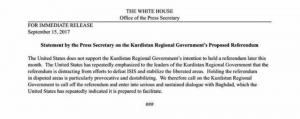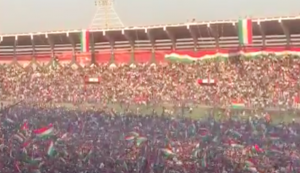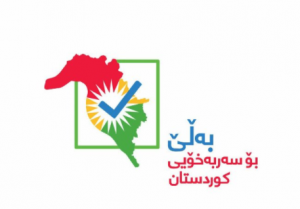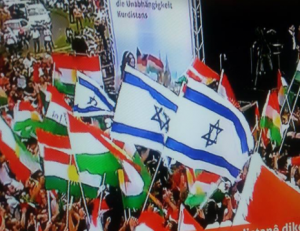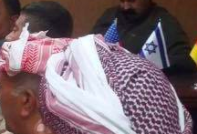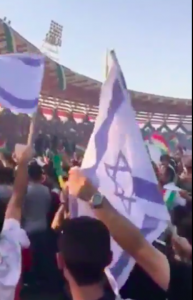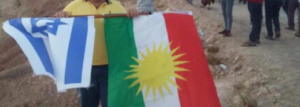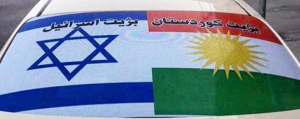With the Kurdistan referendum in the Kurdish region of Iraq quickly approaching, many of the processes set in motion years ago, even decades or 100 years ago, are coming together. On September 15th the Kurdistan Parliament approved the referendum on September 25. There have been many surprises since the June announcement, but many reactions have been expected. Most disappointing has been the US response. Officialdom and the State Department obviously oppose the referendum because they are committed to the status quo and Iraqi “unity.” But more could have been expected from the US Congress and other parts of the US government. On September 15 the White House released a statement opposing the referendum. “We therefore call on the Kurdistan Regional Government to call off the referendum.” An unprecedented decision to meddle in the internal affairs of another country, ostensibly clothed in the need to defeat ISIS.
Nevertheless a lot of the coverage in the US media, including opeds, have been positive. Jonathan Tobin wrote a piece at the New York Post saying Kurdish independence would be a win for America. Some of the articles are still tinged with an arrogant, almost neo-colonial, language. One notes that the Kurds have “earned” their right to independence. Did Kosovo or East Timor or Kenya have to “earn” its right to independence? What about Czech Republic or Poland or the United States? Why do Kurds need to “earn” this right, a right many other people’s have received?
Another article at The Economist notes that America and Iran agree on opposing Kurdish independence and the referendum. This may cause many to wonder why the US and other western countries are not supporting Kurds in what is simply a vote and self-determination. Why aren’t they standing more closely with a country that has a relatively free press and democratic tradition and has been a key ally against ISIS, one that is pro-Western and had developed its economic and political potential.
Historic gathering in #Dohuk with President Barzani, the UN, UK, and USA in #Peshmerga center once only 5km from #ISIS front lines. 2/3 pic.twitter.com/y6Fpj4K4zO
— Brett McGurk (@brett_mcgurk) September 14, 2017
McGurk in Kurdistan
The US Special Presidential Envoy for Global Coalition to Defeat ISIS, Brett McGurk, found himself at the center of the controversy over Kurdistan’s planned September 25 referendum on September 14th during meetings in the Kurdish region. He called it a “historic gathering in Dohuk with President Barzani, the UN, UK and USA.” The assumption was that along with other western countries they were trying one last attempt to pressure the Kurdistan Regional Government to cancel its planned referendum. However the read out of his press statement from Erbil concentrated on the upcoming Hawija operation and praise for the Peshmerga.
“Then traveled to Sulaymaniyah. And let me first say whenever I’m here in the Kurdistan region just how honored we have been to work with all of you and with the heroic Kurdish Peshmerga in this fight against Daesh. The Peshmerga have suffered almost 2,000 martyrs in this overall campaign, probably about 5 times more the Iraqi forces have suffered. So if you put that into context, this has really been a very extensive campaign against Daesh. It has now lasted almost three years.”
Israel And Russia Manage Relations Over Syria
However when discussing the referendum his tone changed. “We did, of course, reiterate the position of the United States, that this referendum is ill timed and ill advised. It is not something that we can support. That is not simply our position. That is the position of our entire international coalition…We understand that this decision is not his alone. This is a decision that has to be made by all the political leaders here in the Kurdistan Region. And so we would obviously very much encourage the political leaders here in the Kurdistan Region to embrace this alternative path.”
Asked if the US opposition to the referendum was “contrary of basic elements of liberty and democracy of the United States,” the same liberties that the US sought in 1776 when it declared independence, McGurk sounded colonial era notes. “there is no international support for the referendum, really, from anybody. To have the legitimate process, you want to have observers, you want to have the United Nations, you want to have international legitimacy. And there is no international legitimacy for this process…we are is that heading into a referendum on September 25th there is no prospect for any sense of international legitimacy to this process…it’s the position of the entire international coalition that I help lead.”
“THE RUSSIANS ARE COMING” TO THE GOLAN?
Although McGurk is ostensibly involved solely in the war against ISIS, his comments on Kurdistan seem to be deeply interested in making demands of local politics, far more so than his comments about how political activity should take place in Baghdad or Syria’s Rojava. For instance, he said, “we think the parliament should be activated…we hope it can be an environment in which the parties begin to work together to resolve and address many of the important issues confronting the Kurdistan Region.”
The language McGurk employs reads like that of a proconsul, to some it sounds almost in line with previous eras of colonial overlords, speaking down to the native locals and scolding them. It’s like Sir Percy Cox, but the 21t century. Laurie Mylroie at Kurdistan24 compared McGurk to Lawrence of Arabia. In some ways this is a legacy of the Bush years when Paul Bremer and others were seen as proconsuls. Colin Powell told Bush before the 2003 invasion “if you break it, you own it.” (Powell took it as a phrase from Pottery Barn, ‘if you break it, you buy it’). Since then the US has seen itself as the responsible “owner” of Iraq, which has ignored the overall interests of many groups in Iraq in pursuit of certain goals. The current goal is unity. Kurds are in the way of that goal, but the Kurdish region of Iraq has also been a recipient of US aid and support for decades. In recent years this also means financial support for the Peshmerga and training. So it is not a one way street.
My Kurdish friend, do not forget that your "friend" Kissinger stabbed you in the back in 1975 by organizing the Algiers agreement
— Tissot Frédéric (@DocteurTissot) September 14, 2017
But anger at McGurk’s comments and memories of betrayal in the past have not gone away. Frederic Tissot, Consul général de France à Erbil (2008-2012), tweeted “My Kurdish friend, do not forget that your ‘friend’ Kissinger stabbed you in the back in 1975 by organizing the Algiers agreement.”
High hopes
Despite the uncertainty and controversy, the rallies in Kurdistan have grown by the day. On September 14th more than 20,000 (some said 50,000) rallied in Zakho in support of the referendum.“Referendum is a tool, not an objective. The objective is independence. The objective is for us to determine our fate,” Barzani told the crowd. In Akre on Sunday the 10th thousands also rallied, ascending the mountain with torches and flags. On September 12th President Barzani went to Kirkuk where he sat at a table with Vice President Kosrat Rasul and Kirkuk Governor Najmaldin Karim and emphasized the special status of Kirkuk. “Kirkuk should have a special status within the independent Kurdistan based on genuine partnership,” senior assistant Hemin Hawrami tweeted. The issue of Kirkuk has dominated politics for decades and the visit was a reminder of past historic speeches about the city, such as Jalal Talabani’s 1992 speech.
The high hopes for the referendum seem to be spreading after many months of a dull and almost non-existent campaign. On September 5th the campaign for the referendum official began.“The people of the Kurdistan Region deserve an independent state after centuries of struggle. Let’s end subjugation by voting in favor of independence on September 25,” one of the demonstrators told Kurdistan 24. New videos supporting the referendum, often emphasizing diversity, have been produced. There are billboards and a great deal of discussion on social media. Under hashtags such as #YesKurdistan, supporters are tweeting images, logos, rallies and messages of support.
Concerns and controversy
Kurdistan is still trying to reach out abroad with meetings in the UK and elsewhere. It appears that the decision to wait until September 5th to begin a major campaign for the referendum was because of discussions and possibilities that it might be postponed. Rumors persisted even on September 15th that due to US and international pressure for an “alternative” it could be postponed. But there is no clear alternative. Instead Baghdad sought to pressure the KRG by trying to fire the governor of Kirkuk, Najmadin Karim. The KRG nor Karim will accept the Baghdad decision. The US concern that the dispute could meddle in the Hawija operation makes sense, since Hawija is near Kirkuk.
ISIS would like to exploit the dispute and it has continually carried out attacks near Kirkuk. Attacks in southern Iraq killed 60 on September 14th.
Israel supports the referendum
One of the common sights at pro-Kurdish rallies in recent weeks in Europe has been the Israeli flag. In Geneva on September 10th the flag was front and center.
People attend a demonstration in support of the referendum for independence of Kurdish Iraq in Geneva, Switzerland. (VCG/Pierre Albouy) pic.twitter.com/yeCx6Fs74k
— Global Times (@globaltimesnews) September 11, 2017
The same was the case in Oslo, Norway during a rally on September 9th.
Also during a large rally in Cologne, Germany on August 26th
On September 15 in Koln.
From yesterday's historic Kurdish independence festival in Köln.The beautiful Israeli flags are everywhere along Kurdish flags.Biji Israel?? pic.twitter.com/iW5PgFepaz
— Mardini (@MardiniAlan3) August 27, 2017
On September 16th at rallies in Hamburg and Stockholm.
Photos of #Kurdish rallies in #Europe, supporters rally; #Israel #Kurdish flags pics, these in Hamburg (l) and Stockholm (r); @Serxwebun2509 pic.twitter.com/7C2tQJfW3h
— Seth Frantzman (@sfrantzman) September 16, 2017
In Kurdistan the appearance of Israeli flags has also become a phenomenon. At a meeting in Shingal an Israeli, German and other flags were on a table.
In addition at the Zakho rally several flags were flown by the audience
At the Amedi rally on September 15 someone brought an Israeli flag as well
Also a taxi in Duhok was photographed with both flags
In Israel several political leaders have reiterated support for Kurdish independence and rights to a referendum. Israel’s Justice Minister Ayelet Shaked on Monday September 11 speaking at the ICT’s World Summit on Counter-Terrorism supported Kurdish independence. “”Israel and countries of the West have a major interest in the establishment of the state of Kurdistan…I think that the time has come for the U.S. to support the process,” she was quoted as saying.
Former Israel ambassador to the US, Daniel Ayalon, was also quoted on September 12 as supporting Kurdish independence. Kurdistan 24 reported his remarks: “In Israel, and I hope in any decent democratic country in the world, we have great support and appreciation for the Kurdish people..We support a free Kurdistan…We support an independent Kurdistan with [territorial integrity] of these ancient people in their own land.”
On September 13th Israel Prime Minister Benjamin Netanyahu also joined in the support. “Israel supports the legitimate efforts of the Kurdish people to achieve their own state,” Netanyahu said, as reported by Reuters. David Romani at Rudaw wrote an oped discussing his decision and urging him to do more. The Israeli support has now been widely reported, not only in Kurdish media, but also western media, with it held up as the “only country” supporting the Kurdish referendum and independence. This has led other media in the region to speak of conspiracies. Iranian media has also reported Israel’s support. Iran’s Press TV noted “Israel has a longstanding relationship with the Kurds, whom it regards as one of the few non-Arab allies in the area.”
As the referendum nears the issues relating to the international community, the Kurdish parliament, Iran, Turkey and other regional responses will gain in importance.
The parliament re-convenes
Just before 9pm on September 15th the Kurdistan parliament, reconvening after 22 months, approved the referendum. According to Rudaw; “Five points related to the September 25 independence referendum have been approved by 65 out of 68 members of the Kurdistan parliament who attended Friday’s session. First, Kurdistan’s parliament will task the High Elections and Referendum Commission to hold a referendum in the Kurdistan Region and all Kurdistani areas outside the Region’s administration on the question of independence for Kurdistan on Monday, September 25, 2017.”
Gorran and Komal (KIK-Kurdistan Islamic Group) parties did not attend. “Gorran and Komal, two parties who have not yet supported holding the referendum at this time, have said they will not attend today’s session because believe parliamentary procedures convening the legislature have been breached,” Rudaw noted. Together they have 24 and 6 members of the KRG parliament.
From Catalonia to Kurdistan
The Kurds are not the only people in recent years or decades to seek independence by referendum. Scotland, Quebec, South Sudan, East Timor, Kosovo and other countries have carried out referendums or sought independence, some successfully and others have made the choice to remain. The UK has also sought to leave the EU through a referendum.
Catalonia is seeking to hold a referendum on October 1 and Spain has behaved in the same manner that Iraq has toward the Kurds. It has sought to cut off funding to Catalonia. It has gone further and attempted to seize ballot boxes in the region. It has threatened to arrest mayors. Unlike in the Kurdish region, the US and other states have not sought to meddle or interfere in what is an internal issue. In some ways the US has taken on the mantle of Sykes-Picot in the Middle East, 100 years after the French and British carved up the remains of the Ottoman Empire, the US is trying to play the balancing hand and to decide who will receive what after the demise of ISIS.
This is a historic mistake for the US, since traditionally it opposed colonial powers and has supported self-determination as a policy. Clouded by the Cold War and the War on Terror, its policy has become less clear. On the Kurdistan issue it had a chance to support a close ally, and so far it has failed in its chance.
Originally posted at SethFrantzman.com


